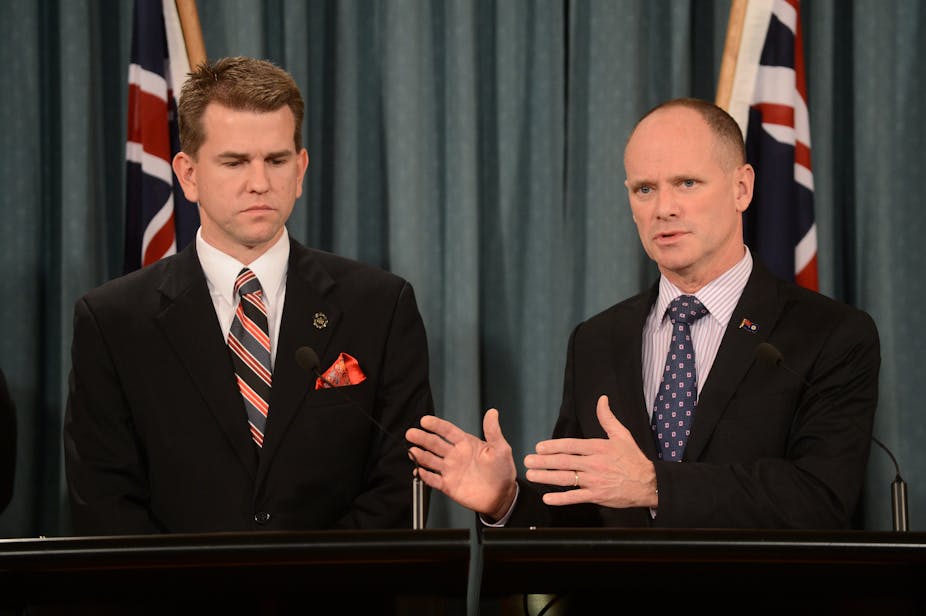The old joke was that visitors to Queensland should turn their clock back one hour and their calendar back 30 years. There are indications state premier Campbell Newman wants to take Queensland back to the time before the Fitzgerald Inquiry blew the lid off political and police corruption in the state.
The Crime and Misconduct and Other Legislation Bill 2014 (Qld) (the CMC Bill) has just been passed by the Queensland parliament. Tony Fitzgerald himself has been highly critical of the changes.
Giving government control of appointments
The legislation contains a number of retrograde provisions. Most importantly, it has removed the requirement that the upper echelons of the Crime and Misconduct Commission (CMC) be appointed with bipartisan support. Previously, the chair and commissioners of the CMC could only be appointed if both the government and opposition agreed.
The legislation gives the government the power to make these appointments in its sole discretion.
The majority report of the Legal Affairs and Community Safety Committee (LACSC) of parliament recommended the appointments take place by way of a committee with a veto power, similar to the system used in NSW for appointments to its Independent Commission Against Corruption (ICAC). The government adopted this recommendation and amended its bill accordingly. The NSW ICAC Committee is made up of 11 members, with six from the government (including the chair and deputy chair), four from the ALP and the Reverend Fred Nile.
Newman has a track record of interference, having sacked the entire membership of the Parliamentary Crime and Misconduct Committee (PCMC) last November. This was in circumstances where the PCMC was investigating whether the acting chair of the CMC, Dr Ken Levy, had misled the PCMC in his evidence about contact with government figures before publishing an article supporting a government crackdown on bikies.
The government was able to appoint Levy without the need for bipartisan support, because he is only acting in the role of chair. When the PCMC was sacked, the investigation of Levy was referred to a select committee on ethics.
That was in November 2013. The committee is yet to produce any report. It has not had any hearings nor have submissions been allowed from interested parties.
The chair of the committee, David Gibson, has just stepped down from the role because of revelations of theft charges from his army days. Gibson has announced he will not re-contest the seat of Gympie because he is having a nervous breakdown.
State attorney-general Jarrod Bleijie, who introduced the CMC Bill, overrode a unanimous vote at the Liberal-National Party July 2013 state convention to require candidates to make full disclosure of their criminal history.
It is difficult to see how any parliamentary committee will be able to effectively exercise a veto power when it is stacked with government members and all members of the committee are aware they can be sacked at the whim of the premier.
Meanwhile, the CMC legislation guarantees Levy’s appointment is extended until the end of October this year. This would see Levy acting in the role for around 18 months.
Muzzling the corruption watchdog
Another retrograde feature of the legislation is the suite of changes that effectively truncate the powers of the body.

The renamed Crime and Corruption Commission loses the function of preventing corruption and would need the approval of the attorney-general to conduct research. The CEO of the CCC, a new position and another direct government appointment, has the power to direct that the CCC not investigate a particular matter.
This narrowing of the powers of the corruption watchdog occurs at the same time as the Independent Broad-based Anti-corruption Commmission (IBAC) in Victoria is desperately seeking broader powers so it can deal effectively with corruption.
Some of the provisions in the CMC legislation are inexplicable. The government reinstated the word “chairman”, contrary to the provisions of the Reprints Act 1992 (Qld), which state that “chairperson” may replace “chairman” consistent with current legislative drafting practice.
This may be a swipe in the direction of the President of the Court of Appeal, Margaret McMurdo, who accused the Newman government of “unconscious bias” against women, in including only one female in the 17 judicial officers appointed in this term of office.
Peter Wellington MP tabled a petition against the changes on the night the legislation was passed, with close to 10,000 supporters. This was ignored by the government, as was polling conducted by Chris Davis, the member for Stafford, which showed nearly 75% of respondents in his electorate supported bipartisan appointments.
The Newman government agenda appears to involve dragging Queensland back to the Joh Bjelke-Petersen era. The detailed and reasoned analysis of experts opposed to the CMC Bill is being afforded the same level of consideration that Bjelke-Petersen gave his critics.
This article has been updated to reflect the passing of the legislation.

